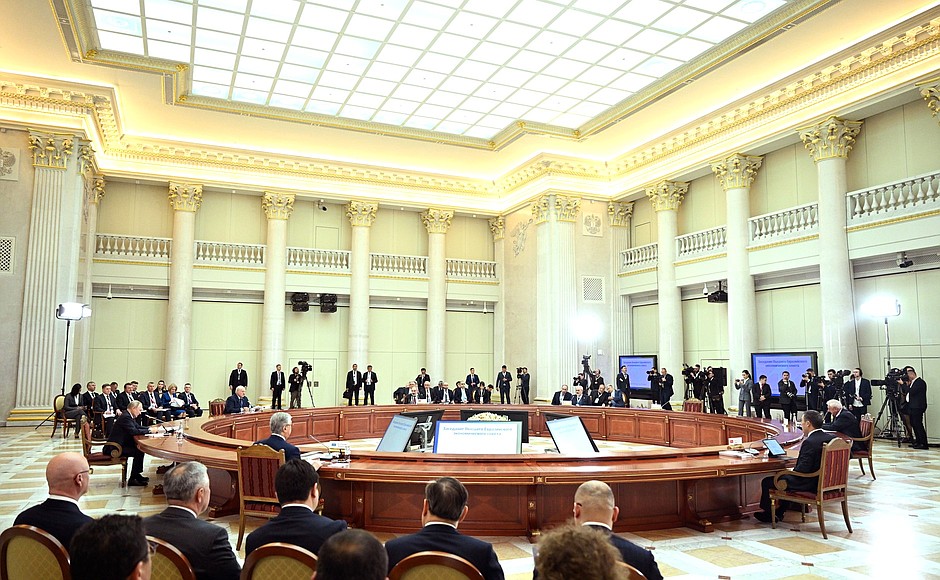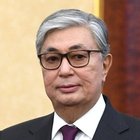
President of Russia Vladimir Putin: Good afternoon, colleagues, friends.
Welcome everyone.
We have just concluded the restricted-format meeting.
I would like to begin by welcoming Minister of Industry, Mine and Trade of the Islamic Republic of Iran Abbas Aliabadi. I will come to it later in my speech, but I would like to note that during the restricted-format meeting today, we noted the signing of an agreement on cooperation and free trade zone between the EAEU and the Islamic Republic of Iran. I think it is a positive step forward, and I will elaborate on it further.
As I earlier mentioned, the restricted-format meeting of the Supreme Eurasian Economic Council has just concluded. We exchanged views on important aspects of our association’s activities and outlined strategic perspectives for deepening integration cooperation. In particular, we discussed the adoption of a declaration on the further promotion of economic processes within the EAEU to 2030 and for the period up to 2045. This idea was approved, and all members of the Supreme Council agreed to adopt the declaration, and we will draft the corresponding decision closer to the end of this meeting.
Essentially, the declaration is a new programme document which outlines steps to enhance joint efforts in key industries and identifies additional areas of cooperation.
Our respective economic ministers, experts and specialised professionals have done a good job coordinating the declaration language. The document incorporates the vision of all five Union countries on the future of Eurasian integration and fully reflects the opinions and interests of each EAEU participant and appears to be quite robust.
During the restricted-format meeting, we summed up the main results of the EAEU activities during the Russian chairmanship which will conclude on December 31. Without a doubt, the Russian side is grateful to all its Union partners for their constructive collaboration, including the efforts to implement the priorities of our chairmanship. Interaction within the Union continues to expand dynamically and successfully across all key areas of integration, despite the existing difficulties arising from the challenging international situation.
We are pleased to note that this year steady economic growth was recorded in all members of the association. Thus, in Russia, GDP added three percent in the first three quarters and we expect it to reach 3.5 percent for the annual results. Other EAEU countries have also recorded a substantial increase in GDP. To my knowledge, it will surpass nine percent in Armenia over nine months, which is a very good figure. In Kazakhstan it will be almost five percent – is this right, Mr Tokayev?
President of Kazakhstan Kassym-Jomart Tokayev: Yes.
Vladimir Putin: Excellent.
In Kyrgyzstan, growth is over four percent and in Belarus it is the same as in Russia – 3.5 percent.
Industrial production in the EAEU has gone up by 3.5 percent. The construction industry has grown 9.3 percent. Importantly, the number of unemployed in the EAEU has gone down 14.2 percent while in Russia the unemployment rate has dropped to its historical low of less than three percent – 2.9 percent.
According to the available data, in the first nine months of this year, trade between our five states grew by 8.9 percent. Moreover, its structure is improving – deliveries of finished high-tech products are going up with a simultaneous decrease in the share of raw material components.
Importantly, the share of national currencies in mutual settlements had surpassed 90 percent. No doubt, this indicator will continue growing given the joint financial measures taken by our countries.
The range of preferential foreign trade partners of the five nations is expanding. As I already said in the beginning, today we had the signing ceremony for a free trade agreement between the EAEU and Iran. I would like to congratulate all of us and the Iranian Minister of Industry and Trade who is present – Mr Aliabadi – on completing work on this strategic document.
The Islamic Republic of Iran is one of the biggest economies in Eurasia, a technologically advanced state, and a key link in the southern trade route between the EAEU markets on the one hand and the countries of the Middle East and South Asia, on the other. Therefore, strengthening ties with that country is bound to bring obvious benefits to all participants of our association, including the Islamic Republic of Iran itself.
As we know, the provisional trade agreement between the EAEU and Iran, which was operating since 2019, allowed us to double our trade although it covered only a small list of commodity items. Meanwhile, under the agreement signed today, tariff exemptions will apply to over 85 percent of our commodity range and to more than 90 percent of the current volume of trade of our countries with the Islamic Republic of Iran. We hope that all member countries will promptly perform all the necessary ratification procedures.
I want to remind you that important agreements are currently being drafted with other countries with strong economic potential. I mean a preferential agreement between the EAEU and Egypt, one of our key partners in the Arab world and Africa with which EAEU nations have close relations and intensive trade and economic contacts. Work on a draft free trade agreement with Egypt is at a very advanced stage. And we are certainly interested in having it signed as soon as possible.
Apart from that, the Eurasian Commission is negotiating with the United Arab Emirates and Indonesia. The formation of free trade zones with these countries will further increase the export potential of the EAEU, step up mutual supplies to the markets of friendly states and thus give additional impetus the Union’s economies, as well as enlarge and diversify our common market.
Overall, as the EAEU’s authority and economic weight grows, an increasing number of countries and international organisations are showing interest in establishing mutually beneficial contacts with the EAEU. We have already established close cooperation with such major regional structures as the Shanghai Cooperation Organisation and the Association of Southeast Asian Nations
The work on aligning integration processes within the EAEU and China's Belt and Road Initiative is also yielding real results.
Going back to cooperation within the EAEU itself, I would like to emphasise that a number of important decisions have been taken this year in the areas of industrial cooperation, localisation of production, and deepening cooperation in agriculture and food security.
I will note, in particular, that at the Moscow EAEU summit in May we endorsed the launch of a special financing mechanism providing for special privileges for economic projects involving three or more member countries of the Union.
This year, we have approved rules for mutual trade in electricity in the common market and the Council of Heads of Authorised Energy Authorities of the EAEU countries has begun its work. Following our meeting, we will approve a decision to grant this Council additional supervisory powers.
Intensive work continues on the development of the Eurasian Union's common transport system, which includes the North-South international corridor. In this regard, I would like to emphasise our cooperation with the Islamic Republic of Iran, which holds key positions here.
Cooperation in science and technology has intensified, and the technological sovereignty of the EAEU states is being consistently strengthened. Our countries’ joint efforts are promoting the digital agenda, including the creation and successful development of an integration information system, the establishment and application of common standards for data exchange and the formulation of rules for digital commerce.
Another significant step in this direction will be the signing of a protocol today to amend the Treaty on the EAEU Customs Code, specifically to regulate foreign electronic commerce.
Naturally, the agenda of this Supreme Council meeting also includes other important issues of integration cooperation. These include the coordination of macroeconomic policies, the removal of remaining restrictions and barriers to mutual trade, the improvement of anti-dumping mechanisms, the development of a common market for services, and the convergence of legal regulations in the sphere of natural monopolies. Relevant agreements have already been coordinated and will be formalised by our decisions today.
Friends,
On January 1, Russia will transfer the chairmanship of the EAEU to Armenia. I would like to take this opportunity to wish success to our Armenian colleagues and friends. Of course, we will provide all the necessary assistance to them.
We have repeatedly mentioned that next year will be the tenth anniversary of signing the EAEU founding treaty. Since this is an anniversary event, we have agreed, at our meeting in restricted format, to hold a summit in May 2024 in Moscow. Everyone agreed with my proposal.
This summit will mark the beginning of a new decade of close collaboration to deepen integration and improve the well-being and living standards of our citizens. Today, we will approve a long-term declaration on the future development of economic processes within the Eurasian Economic Union until 2030 and up to 2045, listing clear reference points on this matter.
I would also like to mention that decisions regarding the renewal of the line-up of the Board of the Eurasian Economic Commission and the EAEU Court have been drafted. I would like to take this opportunity to thank all current Board members, judges and especially Board Chairman Mikhail Myasnikovich for the significant contribution to the development of the Eurasian Economic Union. He has accomplished a great deal to ensure the Commission’s steady and effective work.
I would also like to welcome Mr Bakytzhan Sagintayev, who will assume the position of Board Chairman starting from February 1, 2024. We are familiar with his work, as he has already served as a member of the Eurasian Economic Commission. I am confident that he will promptly and energetically embark on fulfilling his new duties. Mr Sagintayev has also worked at the Executive Office of the President of Kazakhstan and served as the Prime Minister of Kazakhstan.
I wish the new members of the Eurasian Commission’s Board and the EAEU Court every success.
Now, I would like to invite Mr Pashinyan to speak, and other summit participants will have the opportunity later on.
Additionally, we will watch a video address by President of the Republic of Cuba Miguel Diaz-Canel Bermudez, as the head of an EAEU observer state. After that, we will hear a report from Mikhail Myasnikovich, and we will sign and approve the draft documents.
Thank you for the attention.
